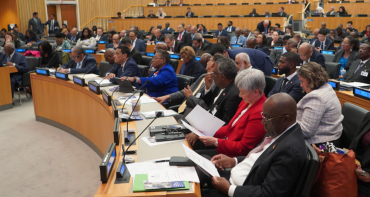On Human Rights Day, The Commonwealth's Dr Shavana Haythornthwaite and Dr Justin Pettit, explain that human rights are also a crucial part of the solution to effectively addressing environmental degradation and climate change.

A blog by Dr Shavana Haythornthwaite, Head, Human Rights Unit, Commonwealth Secretariat and Dr Justin Pettit, Human Rights Adviser, Commonwealth Secretariat.
The critical state of the environment, the acceleration of climate change, the serious impacts of pollution and the increasing loss of biodiversity are undeniable. They jeopardise food security, weaken public health, exacerbate conflict and displacement, deepen inequalities, undermine development, threaten achievement of the SDGs, and impede economic growth – all whilst disproportionately affecting women and other vulnerable persons. They collectively pose an immediate threat to the human rights of every single one of us.
Human rights crucial to the solution
Crucially, human rights are also part of the solution to effectively address environmental degradation and climate change. They are tangible norms that offer real promise to each and every individual and promise of a more meaningful, dignified and secure life. These inalienable rights are fundamental to an individual’s existence. They are designed to stop the abuse of power and to reduce suffering, to empower the vulnerable and to save lives.
Human rights norms can and should motivate, shape and strengthen efforts to develop and deliver policies and programmes to ensure a healthy environment. Examples can include taking an inclusive and non-discriminatory approach to environmental protection and policies addressing freedom of expression in relation to environmental human rights defenders.
Additionally, business enterprises should act in accordance with the Guiding Principles on Business and Human Rights to help mitigate environmental and social risks within the supply chain.
Indeed, there is growing convergence in the broader understanding of human rights obligations relating to the protection of the environment. For example, the Framework Principles on human rights and the environment summarises the main existing human rights obligations that apply in an environmental context.
More recently and of significant noteworthiness is the long-awaited step the Human Rights Council took in recognising, for the first time, the right of everyone to live in a clean, healthy and sustainable environment, which is essential to combatting multifaceted and intertwined environmental challenges.
A reinforcing and interdependent relationship
In its landmark resolution, the Council also acknowledged the mutually reinforcing and interdependent relationship between a clean and healthy environment and the promotion and protection of human rights, highlighting that each is vital to the realisation of the other for present and future generations.
The resolution underscored that the most vulnerable segments of the population – indigenous peoples, older persons, persons with disabilities, and women and girls – felt the human rights consequences of environmental damage most acutely. The Council also invited the UN General Assembly to further consider the matter.
Prior to the resolution, more than 155 countries already recognised, in various formulations, a right to a healthy environment in either international agreements or their national constitutions, legislation or policies. There is also a burgeoning body of international and national jurisprudence in which the right is recognised. Whilst this is now matched with international recognition, the right does not yet benefit from universal agreement as to its content and scope.
Recognition must be followed with action
This move towards universal recognition of the right, whilst both extremely welcome and important, must now be followed with concrete action in order to tackle the worst impacts of the environmental crisis.
A key first step to building on the resolution should thus be to advance consensus on the right’s content and scope so that it can be a springboard with which to facilitate national implementation and drive transformational economic, social and environmental policies that protect people and the planet.
The Human Rights Council resolution called on countries to work together, and with partners, to implement the right to a clean, healthy and sustainable environment. The Human Rights Unit at the Commonwealth is actively engaged and will play its role, providing fora in which member countries can discuss the right and the environmental crisis, and how best to leverage their collective strength and resources to devise effective and sustainable common approaches.
With sufficient determination and collective action, we can take steps to simultaneously advance human rights and protect the environment. We are in a pivotal time of converging crises: climate change, Covid-19, conflict. The need for human rights has never been greater. Human rights alone will not solve the environmental crisis or end its many adverse effects, but making them central to our efforts will ensure that we're closer to succeeding.



